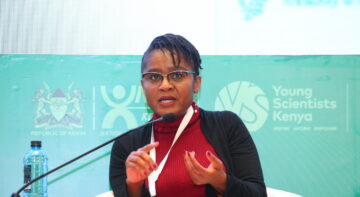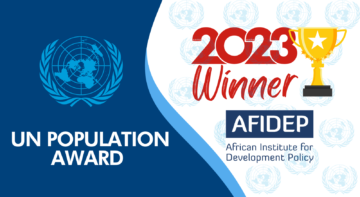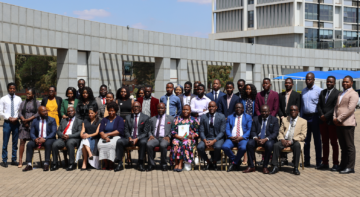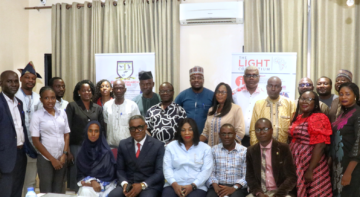Actualités

At AFIDEP, we believe that evidence has a critical role in development efforts. If evidence-informed decision-making (EIDM) played a bigger role in development efforts, Africa would accomplish more in reducing the levels of poverty and improving people’s quality of life. From 25-28 September 2018, AFIDEP experts will join other EIDM players at EVIDENCE 2018 at the CSIR International Convention Centre in Pretoria, South Africa, a conference on evidence, its production and use in decision-making in Africa.
In this interview, AFIDEP’s Dr Rose Oronje (Director of Science Communications & Evidence Uptake) who is a member of the Scientific Programme Committee and the leader of the Good Governance Strand at the EVIDENCE 2018 gives some highlights of the conference.
What role will you and AFIDEP be playing at the EVIDENCE 2018 conference?
I’ve been involved in the EVIDENCE 2018 conference because of my role at AFIDEP. AFIDEP’s work is about strengthening governance and government systems so that they can effectively tackle development challenges. And evidence is critical in the work of governments and in governance. I’ve been part of the scientific committee that has led and driven the scientific focus of this conference.
The conference has four different strands; quality education, communicable diseases, mental health, and good governance. I’ve led the Good Governance Strand – defined what governance means, the central role of evidence in improving governance, the scope of papers the strand is interested in, promoted the strand through social media and other online channels, and led the review and selection of papers to be presented at the conference.
Why governance?
Poor governance and leadership is the biggest barrier to development in Africa. I believe evidence is the lifeblood of good governance. You can’t have good governance without evidence. And governance here refers to, among others, the way governments make decisions and appropriate resources, how parliaments conduct oversight and representation of citizen’s interests, accountability and transparency processes, tracking expenditures, and citizens participation and involvement in government decision-making. This is why AFIDEP is involved in this conference. We really believe that if the many governance challenges are addressed in Africa, then development efforts will achieve much more. And evidence has a big role to play in improving governance.
Apart from you leading the Governance Strand at the conference, what else will AFIDEP be doing at the conference?
I will be presenting two abstracts based on the work that AFIDEP has been doing in African parliaments. One paper shares lessons from our work with the Network of African Parliamentary Committees on Health (NEAPACOH). And the other paper shares findings on a study we’ve done on understanding the ecosystem of evidence use in African parliaments.
I am also part of a panel in the final plenary where they’ll have the leaders of the four strands on a panel to reflect on what is emerging from the conference.
I’ll also co-facilitate one of the satellite forums happening on 25 September 2018 co-hosted by IDRC (International Development Research Centre) and AFIDEP on citizen evidence. It will look at how do we strengthen citizen voices in decision-making processes.
Other AFIDEP experts who will be involved in the conference, either presenting papers or as part of panels include Violet Murunga, Diana Warira and Dr Eliya Zulu.
Why is this particular conference important to AFIDEP?
For the first time, this conference will be recognising leadership in evidence-informed policymaking in Africa. The first winner of the Africa Evidence Leadership Award is the Head of Research in the Malawi Parliament (Ms Velia Manyonga) and as you know we work a lot with the Malawi Parliament since 2013. At AFIDEP we are very proud of Ms Manyonga because we know that she is a product of the Institute’s sustained work in the Malawi Parliament. She has explicitly noted that she is able to champion evidence in Parliament because of the work of AFIDEP.
What do you hope to gain from the conference?
Getting evidence used in policy and programme decisions is really challenging and is a field that is still growing. I’m hoping to learn from other evidence experts on what they’re doing, the lessons they’re drawing from their work, strategies that work, those that don’t work. I’m really hoping that I’ll come away with some ideas and some answers to some of the things I struggle with in understanding how evidence use supports policy-making. I’m particularly interested in how citizen voices get into policy-making processes. That’s part of the reason I’m part of the satellite forum on Tuesday on citizen voices and policymaking. Personally, I believe that citizens can play a big role in holding governments to account. But because often they don’t have access to the information they need and governments don’t provide the information coming out of their programmes, citizens often don’t play this role. They lack that evidence to hold the government to account. So I’m really looking forward to knowing what other people are doing to strengthen the voice of citizens in policymaking.
Secondly, I’m looking forward to networking. A lot of the people at the conference are people I’ve interacted with at other conferences, so I’m looking forward to reconnecting, but I’m also looking forward to building new networks.
AFIDEP is set to present a number of abstracts and be a part of panels at the conference including;
- Knowledge Translation Capacity, Practice and Support Among Researchers in Low and Middle-income Countries: A Structure Review of the Published Literature at 11h00 « 12h30 in the Diamond Auditorium on Thursday 27th. By Senior Knowledge Translation Officer, Violet Murunga;
- Promoting evidence-informed adolescent sexual and reproductive health decisions in Kenya: Lessons from the ensure adolescent sexual and reproductive health project at 09h20 « 09h30 on Thursday 27th, POD 2. By Senior Knowledge Translation Officer, Violet Murunga;
- Oral poster presentation on Making the Dividend Count: The Role of Communication in Bridging Demographic Dividend Research and Africa’s Policy Processes at 09h40 « 09h50 on Thursday 27th, POD 3. By Communications Officer, Diana Warira;
- Oral poster presentation on The evidence ecosystem map in Kenya in relation to communication of the demographic dividend, at 12h20 « 12h30 in the Emerald Auditorium on Thursday 27th. By Communications Officer, Diana Warira;
- Contribution of a Network of Parliamentary Committees of Health to the Ecosystem of Evidence Use in African Parliaments, at 11h00 -12h30 in the Ruby Auditorium on Thursday 27th. By Director « Science Communications & Evidence Uptake, Dr Rose Oronje;
- Ecosystem of Evidence in the Parliaments of Kenya, Malawi and Uganda, at 13h30 « 15h00 in the Diamond Auditorium on Thursday 27th. By Director « Science Communications & Evidence Uptake, Dr Rose Oronje;
- Plenary Session 2 on Good Governance at 09h00 « 10h30 in the Diamond Auditorium on Friday 28th. By Director « Science Communications & Evidence Uptake, Dr Rose Oronje
The event will connect individuals and activities across various initiatives, organizations and fields creating an opportunity to network and share knowledge in EIDM in Africa.
Listen to the full interview here.
Related Posts





